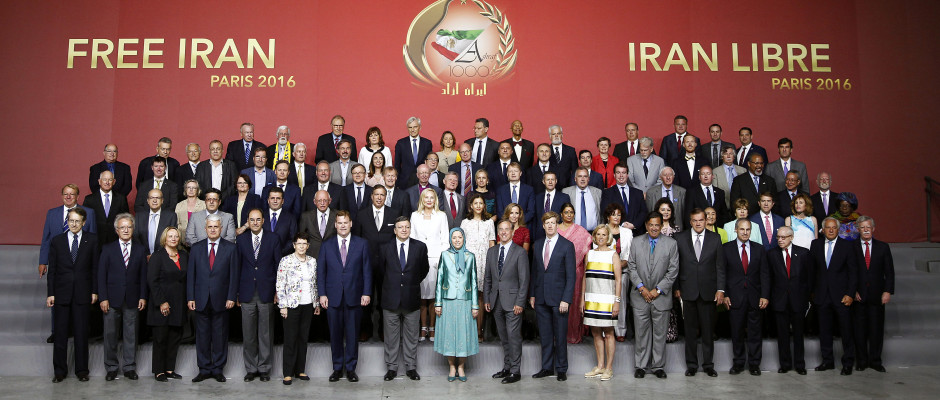
International figures from the US, Europe, and the Middle East standing alongside Maryam Rajavi, expressing their support for a “Free Iran” during the rally in Paris.
Thousands of Iranian opposition members and other international supporters gathered in Paris on July 9th for the annual conference of the National Council of Resistance of Iran (NCRI)—a political umbrella coalition of Iranian opposition groups and personalities which includes the People’s Mujahedeen of Iran (MEK)—committed to “a democratic, secular and non-nuclear republic in Iran.”
The conference supports the “10-point plan” proposed by Maryam Rajavi, President-elect of the NCRI, as the movement’s vision for Iran: a pluralist, secular, and democratic system respecting gender equality, following the rule of law, enforcing a modern and effective judicial system, and abolishing Sharia law. The points also call for the protection of private property and the wider adoption of a market economy. On the foreign policy front, the points call for an Iran that respects peaceful coexistence and regional cooperation, free of weapons of mass destruction.
Rajavi stated that the participants of the Paris convention represent the voice of millions of oppressed Iranians who long for freedom and democracy and expect that the next U.S. President, as well as other western leaders, to stand with the Iranian people and stop appeasing the Tehran regime. She added that the international community must adopt a firm policy condemning the regime’s human rights violation and its export of terrorism.
The number of officials endorsing and attending the NCRI’s rally appears to increase every year. This year’s “Free Iran” rally was joined by a selection of high-level politicians, political leaders, military officials, religious leaders, and former diplomats from around the world. Several personalities and former officials attended from the Arab world. Even though he currently has no official government title, Prince Turki al-Faisal (the former head of the Saudi intelligence services) gave a speech at the conference accusing the Iranian regime of “bringing nothing but destruction, sectarianism and bloodshed, not only to Iran, but also to all the countries of the Middle East.” He further announced that he supports the toppling of the regime.
The NCRI states that the Iranian regime is continuing to export Islamic fundamentalism and is still testing ballistic missiles, violating UN Security Council Resolution 2231, and assisting Bashar al-Assad, Hezbollah, and Shiite militia groups, fueling sectarianism more forcefully. The protesters also emphasized that the nuclear agreement between the P5+1 powers and Iran concerning Tehran’s nuclear program has not made Iran less repressive, regionally and domestically.
Attributable to the absence of set rules for peaceful transition of leaders, authoritarian regimes—like the one in Tehran—tend to be reluctant to change even in response to known problems. The unexpected nature and the speed of the overthrow of authoritarian regimes is somewhat challenging. What is noteworthy in this year’s rally is the attendees’ wide support for a “regime change.” The big question is whether such an annual event can be a facilitator for overthrowing the regime.
It is undoubtedly clear that the world is becoming a more dangerous place where Iran is actively supporting international terrorism or if it had really succeeded in acquiring nuclear weapons. Regime change enthusiasts say Iran is ruled by “irrational” mullahs who cause trouble to the U.S. and its allies. I found a Google map showing Iran surrounded on all sides by U.S. military bases and other NATO sites. At least, we can assume that the Iranian mullahs understand that there are red lines they dare not cross!
Moreover, there is little evidence that the leaders of Iran are “irrational.” They have been instead cautiously conservative: Tehran’s strategic imperatives have always prevailed when it comes to foreign policy. For example, during the early stages of the Iraq-Iran war, the Ayatollah Khomeini said that he would “never make peace” with Saddam Hussein. However, when the war dragged on for years and the international community turned against Iran, he concluded a compromise peace. Is this a behavior of an irrational regime?
Sorting through the possibilities of whether the Iran Freedom Rally can lead to a regime change therefore requires dealing with a series of deeper policy questions: How much time do we have until the nuclear deal is a clear-cut case? Is there any non-military approach—not yet tried—that offers a realistic prospect of a regime change? Will an alternate regime be surely more democratic than the current radical Islamic Republic? There are millions of Iranians who dislike the clerical regime, but do they trust the opposition outside Iran? And, on a longer-term front, could a new democratic Iran re-think the quest for nuclear weapons?
It is obvious that the U.S. is not at ease with the benefits of regime overthrow via military action. Washington is not prepared for a long, messy struggle of attrition. Moreover, Iran does not look worse in terms of its authoritarianism, treatment of women, and the adoption of a fair legal system, compared with, let’s say, Saudi Arabia. It seems that such assessments have led Washington to the following policy conclusion: America’s strategic interests reside in neutrality across the Iranian-Saudi divide.
The regime change option neither has the realistic means of addressing all of the above questions nor the assurances that it will be an easy or definitive policy path.